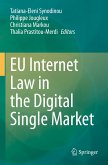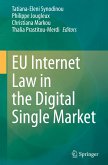This book engages with the shifting legal terrain of the European Union in light of recent advances in generative Artificial Intelligence. It reflects on the ways in which existing legal frameworks, developed over several decades, are being tested by technologies that operate with increasing autonomy, complexity, and opacity. Rather than treating AI as a singular phenomenon, the volume brings together diverse perspectives to examine how law responds across different domains such as liability, data protection, intellectual property, and digital security.
The contributions draw from a range of legal traditions and critical approaches. Some chapters focus on how rules on defective products must evolve to account for autonomous behaviour. Others explore new forms of labour governance shaped by automated decision-making, as well as privacy concerns that require novel safeguards tailored to the evolving capacities of AI systems.
The book also turns to the field of data protection, observing the ways in which judicial reasoning under the GDPR is adjusting to the demands of machine learning. This is complemented by a reflection on the role of design in ensuring transparency and accountability within digital urban infrastructures.
Copyright law is addressed in a chapter that examines how the rise of AI-generated content unsettles long-standing concepts of authorship, originality, and ownership. It questions whether current intellectual property regimes remain adequate and considers the legal implications of using data as a form of remuneration in digital creative markets.
Consumer protection is examined through a fresh lens, particularly where AI systems influence contracts, choices, or vulnerabilities. The discussion includes early insights into proposals on AI liability and considers the risks facing users in increasingly automated environments. Legal responses to cybercrime and digital surveillance are also discussed, including the place of interception measures and the admissibility of electronic evidence. The broader implications of large-scale language models for digital resilience and public security are critically assessed.
Rather than offering a fixed map, the volume encourages a more dynamic reading of European digital law in the age of AI. It speaks to lawyers, researchers, and institutional actors concerned with how legal orders can hold firm to foundational principles while adjusting to the realities of emerging technologies. Each chapter invites the reader to reflect not only on where law stands, but also on where it may, and should, go next.
The contributions draw from a range of legal traditions and critical approaches. Some chapters focus on how rules on defective products must evolve to account for autonomous behaviour. Others explore new forms of labour governance shaped by automated decision-making, as well as privacy concerns that require novel safeguards tailored to the evolving capacities of AI systems.
The book also turns to the field of data protection, observing the ways in which judicial reasoning under the GDPR is adjusting to the demands of machine learning. This is complemented by a reflection on the role of design in ensuring transparency and accountability within digital urban infrastructures.
Copyright law is addressed in a chapter that examines how the rise of AI-generated content unsettles long-standing concepts of authorship, originality, and ownership. It questions whether current intellectual property regimes remain adequate and considers the legal implications of using data as a form of remuneration in digital creative markets.
Consumer protection is examined through a fresh lens, particularly where AI systems influence contracts, choices, or vulnerabilities. The discussion includes early insights into proposals on AI liability and considers the risks facing users in increasingly automated environments. Legal responses to cybercrime and digital surveillance are also discussed, including the place of interception measures and the admissibility of electronic evidence. The broader implications of large-scale language models for digital resilience and public security are critically assessed.
Rather than offering a fixed map, the volume encourages a more dynamic reading of European digital law in the age of AI. It speaks to lawyers, researchers, and institutional actors concerned with how legal orders can hold firm to foundational principles while adjusting to the realities of emerging technologies. Each chapter invites the reader to reflect not only on where law stands, but also on where it may, and should, go next.








